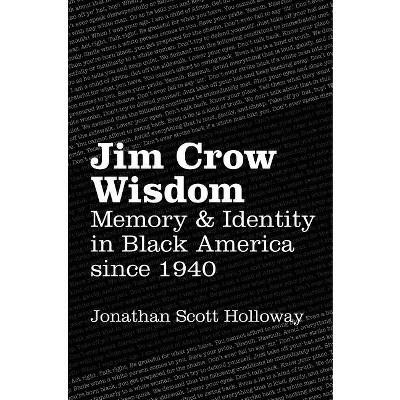Jim Crow in the Asylum - (Studies in Social Medicine) by Kylie M Smith (Paperback)

About this item
Highlights
- There is a complicated history of racism and psychiatric healthcare in the Deep South states of Georgia, Alabama, and Mississippi.
- About the Author: Kylie M. Smith is associate professor and director of the Center for Healthcare History and Policy at Emory University.
- 342 Pages
- Medical, Health Policy
- Series Name: Studies in Social Medicine
Description
About the Book
"There is a complicated history of racism and psychiatric healthcare in the Deep South states of Georgia, Alabama, and Mississippi. The asylums of the Jim Crow era employed African American men and women; served as places of treatment and care for African Americans with psychiatric illnesses; and, inevitably, were places of social control. Black people who lived and worked in these facilities needed to negotiate complex relationships of racism with their own notions of community, mental health, and healing. Kylie M. Smith mixes exhaustive archival research, interviews, and policy analysis to offer a comprehensive look at how racism affected Black Southerners with mental illness during the Jim Crow era. Complicated legal, political, and medical changes in the late twentieth century turned mental health services into a battlefield between political ideology and psychiatric treatment approaches, with the fallout having long-term consequences for patient outcomes. Smith argues that patterns of racially motivated abuse and neglect of mentally ill African Americans took shape during this era and continue to the present day. As the mentally ill become increasingly incarcerated, Jim Crow in the Asylum reminds readers that, for many Black Southerners, having a mental illness was-and still is-tantamount to committing a crime"-- Provided by publisher.Book Synopsis
There is a complicated history of racism and psychiatric healthcare in the Deep South states of Georgia, Alabama, and Mississippi. The asylums of the Jim Crow era employed African American men and women; served as places of treatment and care for African Americans with psychiatric illnesses; and, inevitably, were places of social control. Black people who lived and worked in these facilities needed to negotiate complex relationships of racism with their own notions of community, mental health, and healing.
Kylie M. Smith mixes exhaustive archival research, interviews, and policy analysis to offer a comprehensive look at how racism affected Black Southerners with mental illness during the Jim Crow era. Complicated legal, political, and medical changes in the late twentieth century turned mental health services into a battlefield between political ideology and psychiatric treatment approaches, with the fallout having long-term consequences for patient outcomes. Smith argues that patterns of racially motivated abuse and neglect of mentally ill African Americans took shape during this era and continue to the present day. As the mentally ill become increasingly incarcerated, Jim Crow in the Asylum reminds readers that, for many Black Southerners, having a mental illness was--and still is--tantamount to committing a crime.
Review Quotes
"In clear, sober prose, Smith merges policy, clinical science, and patient experience to analyze racism and psychiatry's symbiotic relationship. Working against immense silences in the archive, Smith unearths the voices of Black patients and their advocates, providing vital insight into how they faced and resisted their confinements and treatments. Jim Crow in the Asylum is required reading for anyone interested in the histories of psychiatry, the South, and race."--Jonathan Sadowsky, Case Western Reserve University
"This is the best mixture of careful social history with an intellectual and theoretical approach to the history of racism and psychiatry that I have seen. The book will be a model for every historian--a must-read."--Susan M. Reverby, author of Co-Conspirator for Justice: The Revolutionary Life of Dr. Alan Berkman
About the Author
Kylie M. Smith is associate professor and director of the Center for Healthcare History and Policy at Emory University.Shipping details
Return details
Trending Book Pre-Orders











